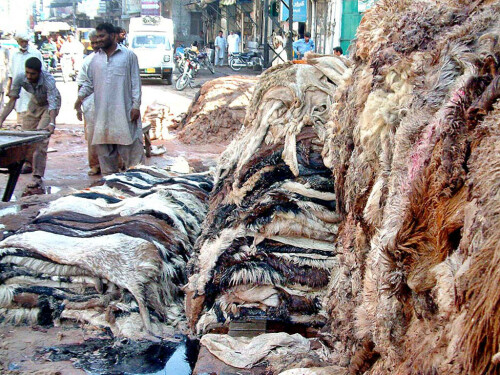Leather Industry Seeks Duty Reduction for Chemical Imports
Pakistan’s leather sector has advocated for a decrease in customs duties on imported chemicals essential for leather production. This adjustment, they argue, would enhance the industry’s competitiveness and financial stability within the region, according to recent reports.
Hamid Arshad Zahur, the Central Chairman of the Pakistan Tanners Association (PTA), has proposed a reduction in customs duty from 20% to 16%, alongside a decrease in Additional Customs Duties (ACD) from 4% to 2% on all chemical imports.
This recommendation emerges as Muslims worldwide prepare for the Eid-ul-Adha celebrations. In Pakistan, the first day of Eid is scheduled for Saturday, June 7.
Zahur noted that approximately 40% of Pakistan’s total leather manufacturing relies on animal sacrifices made during Eid-ul-Adha.
Hide Collection Statistics
Providing data, the PTA central chairman mentioned that tanners processed approximately 0.7 million animal hides last year, including 4.5 million goats, 2.5 million cows, 0.5 million sheep, and 25,000 camels.
The cumulative value of these hides was around Rs10 billion, as per his statement.
Zahur also pointed out that about 25% of the hides, valued at roughly Rs4 billion, were damaged due to improper handling and delayed preservation with salt.
Call for Improved Abattoirs
“Tanners have consistently urged both the federal and provincial administrations to establish appropriate abattoirs to prevent hide wastage,” he stated.
“The country incurred losses of hides worth Rs4 billion because of inadequate handling, representing 40% of total local production.”
The PTA central chairman stressed the importance of the government setting up centralized slaughterhouses for religious sacrifices, similar to practices in other Muslim nations such as Saudi Arabia, Malaysia, Türkiye, and Indonesia.
Budget Proposals
In its budget proposals, the PTA has requested that the export sector remain under the original Fixed Tax Regime, but with an increase in turnover tax from 1% to 1.5% to boost government revenue.
The leather industry typically operates with a 4-8% profit margin. Thus, a 1.5% turnover tax would effectively amount to a 25% tax on profit, aligning with the Federal Board of Revenue’s (FBR) revenue generation objectives, according to the PTA.
Zahur advised against transitioning the export sector to the final tax regime.
He voiced his opposition to the proposal to impose sales tax on raw material imports under the Export Facilitation Scheme (EFS) in the upcoming budget.
“This action by the FBR/Ministry of Finance would completely undermine the fundamental principle of no duty, no drawback, upon which the EFS was initially founded,” he explained.
“A mistake was made last year by levying sales tax on domestic sales under EFS, and imposing sales tax on raw material imports under the EFS would compound this error.”
“This will create a cash flow crisis, undermine the EFS’s purpose, and hinder further export growth,” the PTA official added.
He implored the government to restore the EFS to its original form as of June 30, 2024, where the purchase of domestic and imported raw materials under EFS was exempt from all duties and taxes.
Furthermore, the PTA suggested reducing the sales tax rate to 17% in the next budget from the current 18%. It also recommended setting the minimum tax threshold for salaried individuals at Rs1.2 million per annum.



Comments (0)
No comments yet. Be the first to comment!
Leave a Comment